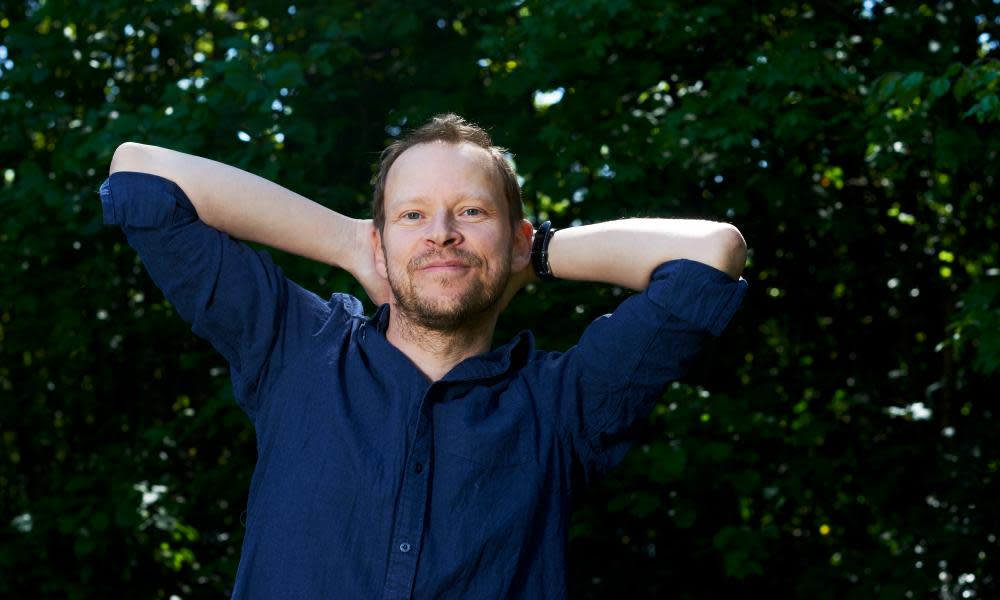Come Again by Robert Webb review – uplifting sliding-doors sci-fi

There’s a scene about halfway through Robert Webb’s first novel when the protagonist, Kate, has a conversation with her father about Francis Fukuyama. Her father attempts to summarise Fukuyama’s The End of History – “we’ve all agreed that liberal democracy is best and so we don’t need to bother arguing any more”. His daughter gives a knowing reply: “I think history might have other ideas.” It’s a microcosm of the conceit that sits behind the whole of Come Again – the idea of dramatic irony applied to a life. Kate knows that history will swiftly overtake Fukuyama’s thesis because she has lived that history once before.
High-concept popular fiction has had an extended moment in the sun, with David Nicholls’s smart, wildly popular One Day a clear model for Webb’s first foray into fiction. Come Again belongs to a more specific literary subgenre, though, one that started with Jenny Erpenback’s exquisite The End of Days, then found fame in Kate Atkinson’s Life After Life and Paul Auster’s 4321. All of these novels play with the idea of second chances, of the contingency of life, the possibility of alternative existences predicated on what might have been. They’re appealing because the impulse behind them is so familiar – which of us has not thought how different our lives might have been had chance or fate not intervened to send us down one particular path rather than another? Which of us has not wished for the gift of hindsight, the ability to intervene in our own histories to do or undo, to make good on our mistakes?
Kate’s life has gone badly off course. Now in her mid-40s (although she feels “a million”), she works for a university friend, Charles, who has set up a grubby tech firm that scrubs high-profile clients’ online profiles (Prince Andrew is a key customer). Much worse, she has recently lost the love of her life – Luke, her partner of 28 years, whom she first met during freshers’ week at York – to a rare form of cancer. Kate is busily drinking her way towards an early death while committing a rather unlikely sort of career suicide when she wakes up to find herself – or rather her consciousness – inhabiting the body of her teenage self, newly arrived at university. Whether it’s a dream or an act of grace, Kate is able to live her life again, and the passages in which she waits for her first glimpse of Luke – the man who will be the centre of her adult life – are hugely moving.
Related: 'They were literally about to turn me off and on again': Robert Webb on his brush with mortality
The novel is split into three sections – life before what Kate comes to call “The Experience”, her time living as her younger self, and then her existence after it, lived in the light of that bizarre transformation. I worried that Come Again would be nothing more than a kind of pulpy Sliding Doors, offering pound-shop existentialism and manipulative mawkishness. In fact, Webb has Kate worry from the start about the butterfly-effect consequences of her presence in this chapter of history, not only about how to make things better, but how not to make them worse. The novel really comes into its own in these central passages, which are both a pleasingly nostalgic campus novel and a meditation on the physics and ethics of time travel.
Webb’s memoir, How Not to Be a Boy, was a genuinely smart and affecting read; here he proves that he can write about others as well as he writes about himself. This isn’t a masterpiece, but it’s a likable, readable piece of “up-lit” with enough intelligence applied to the sci-fi set-up to keep you suspending your disbelief. It had me reaching for Adam Phillips’s masterly Missing Out, and thinking wistfully about all the lives I might have led, all the roads not taken.
• Come Again by Robert Webb is published by Canongate (£16.99). To order a copy go to guardianbookshop.com. Free UK p&p over £15


